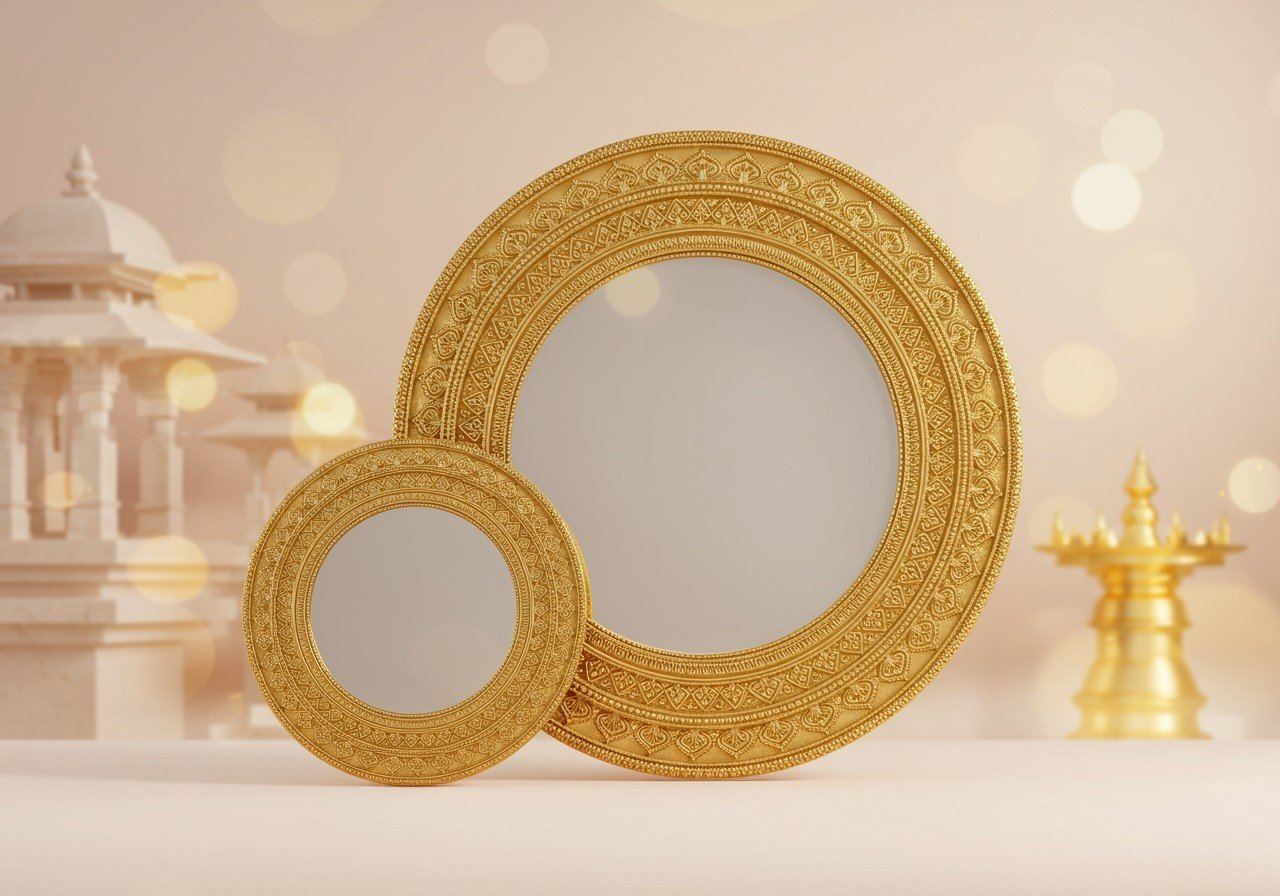
In India, a mirror isn’t just a tool for checking appearances; it’s deeply embedded in our culture and traditions. While modern homes commonly feature regular mirrors, there’s a timeless appeal to the Aranmula Kannadi, a unique metal-alloy mirror from Kerala. Let’s explore the differences between these two reflecting surfaces, considering both their practical uses and cultural significance in the context of 2025.
Material and Construction: A Tale of Two Mirrors
The core difference lies in their composition:
- Aranmula Kannadi: These mirrors are handcrafted from a unique metal alloy. The exact composition is a closely guarded family secret, passed down through generations of artisans in Aranmula, Kerala. It typically involves copper and tin, sometimes with zinc, creating a front-surface reflecting mirror entirely without glass. This traditional method results in a unique piece of art.
- Regular Mirrors: Standard mirrors are made from glass with a reflective coating on the back, often made of silver or aluminum. Mass-produced and widely available, they come in various thicknesses and features, like anti-fogging or shatterproof layers, catering to different needs and budgets.
The Reflection: A Matter of Clarity and Depth
- Aranmula Kannadi: Its front-surface reflection creates an incredibly clear image without the refraction and distortion seen in regular mirrors. The “no-gap reflection,” where your finger seems to touch its image, is a hallmark of its precision. This unique characteristic gives it an almost magical quality, enhancing its traditional and spiritual significance.
- Regular Mirrors: Light passes through the glass before reflecting off the back surface, resulting in a slight but noticeable distortion. While adequate for everyday use, this refraction doesn’t offer the same clarity as the Aranmula Kannadi’s front-surface reflection.
Craftsmanship and Heritage: A Legacy of Skill
The making of an Aranmula Kannadi is an art form in itself:
- Aranmula Kannadi: Each mirror is painstakingly handcrafted by skilled artisans, a process that can take up to two weeks. This meticulous approach, passed down through generations, results in a unique, high-quality mirror that embodies Kerala’s rich cultural heritage. It’s not merely a mirror; it’s a legacy.
- Regular Mirrors: Modern manufacturing processes allow for mass production, ensuring affordability and widespread availability. While offering practicality, they often lack the unique charm and personal touch of handcrafted items like the Aranmula Kannadi.
Cultural Significance: Beyond the Reflection
In India, mirrors hold a special place in our traditions, and the Aranmula Kannadi exemplifies this:
- Aranmula Kannadi: More than just a mirror, it’s a symbol of prosperity, luck, and positive energy. Often included among the Ashtamangalyam (eight auspicious items) in Kerala, it’s treasured for its spiritual significance, believed to bring good fortune and blessings. It represents a deep connection to tradition.
- Regular Mirrors: While serving their practical purpose in our daily routines, regular mirrors generally lack the deep-rooted cultural and spiritual significance of the Aranmula Kannadi. They are utilitarian objects, essential yet commonplace.
For authentic pooja items and a genuine Aranmula Kannadi, visit Poojn.in, India’s trusted online store for cultural and spiritual products.
Market Trends in 2025: Blending Tradition and Modernity
Even in the digital age, tradition holds strong. In 2025, we see a renewed interest in cultural heritage:
- Aranmula Kannadi: Increasingly, people are seeking authentic, handcrafted items. The Aranmula Kannadi’s timeless appeal resonates with those who value tradition and heritage. Poojn.in makes it convenient to acquire this piece of Kerala’s heritage through secure online shopping.
- Regular Mirrors: While regular mirrors remain popular for their functionality and affordability, trends are evolving. We see a shift towards decorative and statement pieces – minimalist frames, ornate vintage styles, wavy shapes, integrated lighting, and layered displays – adding a touch of personality to modern interiors.
Explore our range of Jati Kapali Ghat and other puja essentials at Poojn.in to complement your Aranmula Kannadi.
Identifying a Genuine Aranmula Kannadi: Preserving Authenticity
With increasing demand comes the risk of imitations. Here’s how to ensure you’re purchasing an authentic Aranmula Kannadi:
- Source Wisely: Purchase from certified artisans, reputable dealers, or trusted online platforms like Poojn.in.
- Look for the Mark: Authentic pieces often bear a maker’s mark or certification. This assures quality and provenance.
Poojn.in is committed to offering only genuine Aranmula Kannadi mirrors, ensuring you receive a product of true cultural significance.
Aranmula Kannadi: A Timeless Treasure
More than just a mirror, the Aranmula Kannadi is a reflection of India’s rich artistic heritage and spiritual depth. Whether adorning a traditional home or a modern setting, it serves as a tangible link to the past, a symbol of prosperity, and a testament to enduring craftsmanship. Poojn.in offers you the opportunity to bring this unique treasure into your life, connecting you to the cultural legacy of Kerala.
Discover more about Kerala’s rich temple heritage on Poojn.in’s blog.
You might also be interested in exploring our other offerings such as Panch Ratna and Siddhi.


